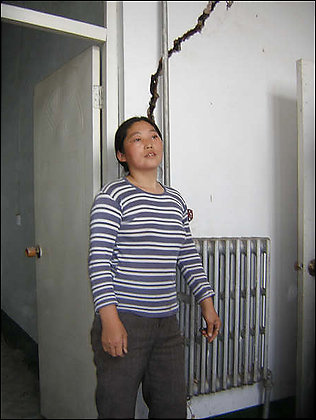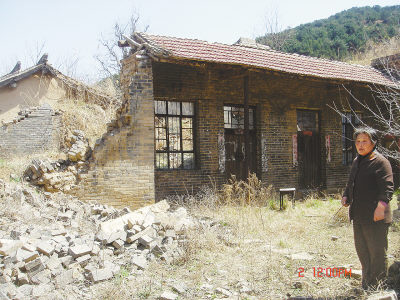

 字體:小 中 大
字體:小 中 大 |
|
|
|
| 2007/06/02 17:11:54瀏覽1404|回應4|推薦3 | |
比較較早的中國青年報與後來華盛頓郵報的報導,華郵八成是看到中青報的報導才去採訪的。上為陳光娥的房屋(華郵),下為王玉珍和她坍塌的房子(中青報)
By Edward Cody 大安頭, China – 陳小娥 was home alone and fast asleep, she recalled, when the windows started to shatter for no apparent reason, like a scene out of a horror movie. "I was frightened out of my wits," 陳 said. That scary night was only the beginning. Pretty soon cracks appeared in the walls, some several inches wide. Then the floor buckled. Ultimately, 陳 and her family had to move out and seek shelter elsewhere. Their three-year-old brick home became too dangerous to live in. The house joined a growing list of buildings in 大安頭 that have slumped to one side and split apart over the last several years because of what is happening beneath them. The mountain atop which the village was built has been so honeycombed with underground coal mining that the crust of the earth is giving way. "The earth below us is hollow because of the coal mining," said 李小志, the village paramedic, who has been forced to move his family out of three houses since 2003 and now stays in the local clinic. "Almost every house has cracks now. The only difference is how big they are." 大安頭, located in 山西 province about 400 miles southwest of Beijing, has become another victim of China's energy rush. The country's booming economy, with growth of nearly 10 percent a year, has produced a growling hunger for coal, which fuels 70 percent of More than half the houses in 大安頭 have developed cracks, and half the 400 residents have moved away. Across 山西 province, countless shafts have penetrated the hillsides where farmers live and plant their corn and wheat. The mines produce mountains of coal, and send truckload after truckload to market along roads covered in black dust. Government officials estimated that more than 7,700 square miles have been hollowed out by miners in 山西, leaving the earth riddled with empty caverns and causing the crust to sink in more than 1,800 places. The underground work is dirty and dangerous, attracting migrant men from villages such as 大安頭 and much farther afield. The government's Work Safety Administration reported that 4,746 miners were killed in Chinese coal mine accidents last year, an average of 13 a day. That tally marked a sharp improvement over 2005, when 5,986 were killed in coal shafts. But Most of the explosions and floods that kill miners have occurred in small-scale operations, often run by unlicensed wildcat companies that bribe local officials to overlook safety violations. By cracking down on such mines and forcing them to close, officials said, they have reduced the number of miners killed and hope to push the toll lower still in the years ahead. But the mining group that came to 可樂 Mountain in 2003, 寺河 Coal, was a big, respectable outfit, with foreign technology and total output of 10 million tons a year across the country. Its arrival caused no consternation in 大安頭, farmers here said. They had long since grown used to seeing mines dug into the rugged 山西 hillsides and loading machinery erected in the narrow ravines that become transport lanes for the coal truck convoys. Besides, they noted, the shafts entered the ground far below the terraced fields where people worked and the mountaintop brick and concrete homes where they lived. For a while, the farmers and the miners coexisted happily. But in late 2003, the cracks started to appear. One by one, they left lizard tracks across the walls. Tiles tipped up on the floors. Vaulted ceilings rained bricks on the grain stored inside. Rooftops gaped open. At one home, an entire room fell in on itself. Farmers used tree trunks to prop up doorways and prevent them from collapsing. Of the 200 houses that make up 大安頭, about half were cracked and more than a dozen had been declared unfit to live in by 2005, according to the village Communist Party secretary, Wang Xiaohui, and other residents. "Now even the clinic is getting dangerous," said 李, the paramedic, as he pointed at cracks zigzagging down the wall. The unsettled earth has destroyed not only walls but also the water system in 大安頭, forcing farmers and their wives to haul water from a communal pipe installed in the village square. Men and women gathered Monday afternoon with plastic buckets and, balancing two on either end of their yokelike shoulder poles, carried away what their family needed. Even the communal pipe, they complained, sometimes goes dry. 陳小娥, 41, said she waited alone on the roof until dawn after being awakened by the shattering windows that night when her home first began to sink. When light came, she sought out Wang, the party secretary, for advice on what to do. It was the mines under 可樂 Mountain, he told her; she should go to the mining company for compensation. Since then, Wang said, the 寺河 company has halted operations and given a total of $346,660 in three payments, in 2004, 2005 and 2006, to compensate the villagers for damage to their homes. So far, most expenditures have been rent subsidies for those forced to evacuate, he said. Small families get $40 a month, and large families, with four or more to house, get $95, he explained. More than $100,000 has been set aside to help villagers pay for new homes that are under construction in the nearly town of Despite the plans for relocation in Runchen, villagers complain that they are not getting properly compensated. What they want, they explained, is cash in hand for the value of the homes they can no longer live in. "We want somebody to pay attention to this," said Wang Guozheng, 67, whose three-family home sits empty and forlorn with cracks yawning in almost every room. Wang Xiaohui, the party secretary, said the villagers have vastly overestimated the value of their homes. The true market value was set by a team of experts sent out last year by the county government, he said, and by the time the villagers pay for new homes in Runchen, the compensation money by and large will have run out. "Don't believe everything those villagers say," he advised. 郭建光文並攝 村裏任意一處,王玉珍“閉著眼睛都能摸過去”。這位年逾六旬的老人,在這裏生活了近40年,熟悉每一個角落。 可眼下,老太太每走幾步路,便會不安地瞅一眼身邊的房屋。她的腳步很輕,輕得“像貓一樣”。說話聲音也不大,只是偶爾說到激動處,才會略微提高嗓門。 “我怕把房子震塌。”她指著不遠處一處宅子輕聲說。這個村子地下空了,房子隨時可能倒塌,她覺得自己得處處小心。 這種走路說話的方式,並不是老太太所慣有的。從前,她步子又快又重,嗓門也很大,即使打招呼,聲音也出奇地響。心情愉快的時候,她還會扯上幾嗓子,唱得鏗鏘有力。但自從她家的房子坍塌以後,她的腳步和嗓門就變成了如今這樣。 不遠處那棟兩層的青磚小樓,並不破舊,但牆體上赫然布著一道虯曲的裂紋。 “都是煤礦鬧的。”老太太被夕陽拉長的影子在地面上緩緩移動,“自從煤礦來了,一切都變了。” 能走的都走了,村子成了空村 靠近可樂山山頂的大安頭村海拔900余米,位於山西省陽城縣東北約20公里處。2005年,一條窄窄的水泥路劈開大山伸進村子。不過,具有現代文明意味的公共汽車從未在此現過身,倒是轟轟作響的採掘機,早在2003年,就已深入到這個村子的地下了。 這一年春天,山西省晉城市煤業集團旗下的寺河煤礦,開始在村子的周邊開挖,一條主巷與村子擦肩而過。這個年產1000多萬噸煤的現代化企業,採用德國和美國的先進技術和設施,悄然改變了這個山村的生活。 整個大安頭村見不到任何煤礦的標誌:既沒有滿臉煤灰的礦工和漫天飛舞的煤塵,也聽不到機器的轟鳴聲和雷管的爆炸聲,然而大山的肚子,很快就被現代化機械洗劫一空,災難性的後果接踵而至。 首當其衝的是房屋。最初是屋頂漏雨,牆皮脫落,牆體裂縫,接著房屋發出嘎吱嘎吱的聲響,地面沉陷,牆體傾斜,門窗變形,大樑錯位,直至房屋倒塌。 王玉珍家的三孔窯位於寺河煤礦劃定的採掘區內,屬於搬遷對象。因找不到合適的房子,又遲遲拿不到補償款,全家只好將就住著。2003年,窯洞開始出現裂縫,不久常有牆皮或掛件無端脫落。次年5月,三孔窯在一場大雨中坍塌。 即使是採掘區外的房屋也未能倖免於難。陳小娥家預製板結構的二層小樓建於2000年,如今大門口和院子裏已是雜草叢生,房屋牆體上佈滿裂縫,活像老樹皮。地面的一角已經下陷,牆體明顯傾斜。幾塊玻璃因門窗變形而破碎。木頭柱子三三兩兩支楞著,勉強支撐起因牆體傾斜而錯位的大樑。一面牆有三個角縫透出光亮,跟別的牆不搭邊,幾欲傾倒。 陳小娥遠遠站著,不敢靠近。“小心牆倒了。”她擺弄著手中的鑰匙,催促道,“這裏危險,快點走吧。” 眼下的大安頭村,無論是新房還是舊房,無論是採掘區內的房屋還是採掘區外的房屋,都不同程度地受到了損害。全村近百處房屋,其中一半以上的新房,70%已不能居住。 當山西這個資源大省像一台巨泵,為這個高速運轉的國家源源不斷輸出能源時,並非只有大安頭村遭遇這樣的命運。2004年的數據顯示,山西省各類礦山採空區面積達2萬餘平方公里,占全省總面積的1/7,且以每年94平方公里的速度遞增。採煤造成地表塌陷1842處,地表破壞面積4.7萬公頃。 人們被迫出走。2004年數據顯示,近10年來,山西省地質災害已迫使145個村莊整體搬遷。而在400餘人的大安頭村,如今也只剩下不到一半人口,其中多數是老人、婦女和小孩。剩下的人,要麼跟別人家擠在一起住,要麼仍舊住在自己搖搖欲墜的危房中。 “能走的都走了,村子成了空村。”王玉珍說。她也想搬走,可是沒有錢,也不知道能搬到哪里去。 我夢到房子塌了,把我活埋了 王玉珍老太太不得不繼續生活在恐懼之中。 她原本膽子很大,連山上出沒的山豬、狼等野獸都不怕。可是,當寺河煤礦開進這個山村腳下後,她還是感到了恐懼。 “下雨天我害怕,睡覺我也害怕。”王玉珍說。每遇下大雨的時候,她躺都不敢躺,要麼索性坐著,要麼拉上丈夫住到別人家,等待天氣放晴後再回來。 從2003年春天她家窯洞出現裂縫開始,王玉珍便再也“沒有睡過一個囫圇覺。”幾乎每天晚上她都要支起耳朵聽聽房屋的動靜。有時,躺上了床也會冷不丁地坐起來,開燈檢查房子。 “有幾次,我夢到房子塌了,把我活埋了。”王玉珍說,她甚至盼著窯洞早點塌,那樣她就不用再夜夜擔心了。 像王玉珍這樣精神高度緊張的人並不少見,村裏幾乎每個人都有類似經歷。“動靜大的那段時間,有的人還會在半夜跑出去,有的人整宿都不敢合眼。”38歲的村醫李小志說。 李小志一落座,陳小娥就把胳膊伸過去,讓他把脈。“她是前些年受了驚嚇,症狀比王玉珍嚴重。”村醫介紹說。 也是從2003年春天開始,也是房子裂縫鬧的,陳小娥幾乎每晚都失眠。晚上,她總是開著燈,和衣躺下,隨時準備逃出屋外。那年9月,正當她關電視準備躺下時,玻璃破碎的聲音讓她驚恐不已。獨自在家的她不敢待在屋子裏,站在露臺上哭了整整一夜,“右眼腫得什麼都看不見”,“比核桃都大”。 一個多月後,陳小娥便急著搬進了丈夫哥哥的房子,那是村裏為數不多的好房子之一。然而歷經多次驚嚇的陳小娥卻落下了病根兒,時常感到頭暈心悸,渾身乏力,有時還會暈倒。最長的一次,她休克了半個小時。看病花了五六千元,但效果不大。 “現在我都不能算一個勞力哩。”陳小娥苦著臉說。她請村醫“弄點好藥”,“地裏的活兒多,我不去幹,以後就要挨餓了。” 但村醫只能表示無奈:“我治不了你的病。多休息,多調養,不操心,也許能恢復。” 這是一場可怕的遊擊戰爭 讓王玉珍備感驚恐的三孔窯終於在2004年5月坍塌了。但是,她的丈夫,“一個膽小的男人”,卻因房屋坍塌受到驚嚇,病倒在床。中醫診斷是寒辛寒酸。 王玉珍不得不帶著患病的老伴到處找房住。好不容易找到一處,可住不了多久,新找到的房子也開始岌岌可危,她便又不得不再次踏上找房之路。由於老伴的病,王玉珍遭到多家拒絕,因為“別人怕老漢老在他們家,不吉利”。 事實上,早在2003年夏天,村裏人就跟王玉珍一樣,開始奔波起來。工作歇下來了,地裏的莊稼活兒也顧不上了,喝酒打牌的男人少了,扯閒話的女人也看不到了,人們穿梭於村中,目標只有一個:看有誰家的房子還能湊合著住,能讓日夜驚恐中的一家人有個棲身之地。 不停地搬進搬出,很多人家的包裹就沒有打開過,隨時準備搬遷。有些家庭分散住在不同人家;有些家庭吃飯睡覺不在一處;有些實在找不到房子,便乾脆離開村裏。自2003年起,大安頭村沒搬過家的人在20%左右。 這種狀態持續了兩年。直到2005年寺河煤礦的採掘面遠離這個村莊,情況才略有好轉。但房屋繼續出現問題,只是速度緩慢了一些。 “這是一場可怕的遊擊戰爭。”村醫李小志這樣形容村裏人這幾年的生活。 他已記不清楚自己搬過多少次家了。他家預製板結構的兩層樓房於2002年完工,共計花費15萬元。但一年後,房子就不能住人了。其損毀程度,與陳小娥家的房子不相上下。如今,這房子只用來存放糧食和傢俱。因為漏雨,傢俱大多已破爛不堪。 2004年4月,李小志夫婦第一次搬家。然而9個月後,借住的房子也成了危房,他們只好第二次搬家。沒過多久,他又不得不再次搬遷。這時,村裏幾乎所有還未變成危房的房子都已經住滿了人,有的房子甚至擠了三四家,10多口人。夫妻倆只好蹭覺蹭飯,從東家跑到西家,再從西家跑到另一家。最多時住一個月,最少時只能住兩三天。他們打過地鋪,睡過窩棚,和別人擠過炕頭,在顛沛流離中度過了3個月。 到別人家蹭住,李小志夫婦感覺不好意思,幾乎每次都會帶上一些東西,這增加了他們的開支。他還答應過給別人付房租,可至今未付。李小志認為,如果他不是村裏唯一的醫生,他的命運“不會有如此幸運”。 “一個好端端的家就這樣給毀了。”站在自家廢棄的院裏,李小志說。院子裏長出一棵麥苗,他用力拔了出來,苦笑道:“長得比地裏的都好。” 村民們不斷向有關部門反映問題,他也屢次找村裏和鎮裏的幹部說明情況,可至今沒有人告訴他該怎麼辦。 “我感到無助。”李小志說著,猛吸一口煙,嗆得一陣劇烈咳嗽。 相比較起來,王玉珍還算是境遇好的。她最終找到鎮裏,經鎮領導出面協調,2006年正月,她搬進了村委會原辦公室。但住進去沒幾天,老伴便去世了。 “老漢咽氣前還說想老在自己家裏。”王玉珍回憶著,眼淚流到下巴,她也顧不上擦。為了治好老漢的病,她花光了幾乎所有積蓄。而老伴去世後,她“連給他找個放棺材的地方都找不到”,只好停放在樓下原來的村衛生所。 在她嫁過來近40年裏,吃水第一次變得困難起來 跟村裏所有人一樣,王玉珍還面臨著另一個令她備感頭痛的問題:“煤礦來了,山被挖空,水被抽空了”。在她嫁過來近40年裏,吃水第一次變得困難起來。 村東頭的山溝裏,從前水流不斷。水從山裏滲出來,王玉珍總是在這裏洗衣服,村裏的孩子們也喜歡在這裏嬉戲。“村裏從來沒有缺過水。”王玉珍指著山體說。而現在的河床,地面已經乾涸,稀稀疏疏長著一些白楊樹,看不出一絲水流的痕跡。
|
|
| ( 時事評論|兩岸 ) |











